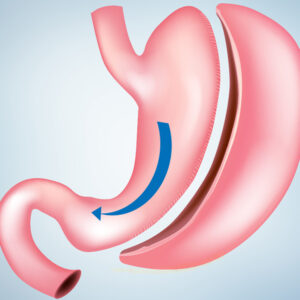
Gastric Transit Bipartition (Diabetes Mellitus/Metabolic Surgery)
Definition of Diabetes Mellitus
Diabetes Mellitus is a chronic condition characterized by elevated levels of blood glucose (sugar) resulting from a deficiency in insulin secretion or insulin resistance. There are two main types of diabetes, type 1 and type 2. Type 1 diabetes is an autoimmune disease where the body’s immune system attacks and destroys the insulin-producing cells in the pancreas, while type 2 diabetes is the result of the body becoming resistant to insulin over time.
Gastric Transit Bipartition
Gastric Transit Bipartition (GTB) is a type of metabolic surgery that involves dividing the stomach into two separate parts. The first part, called the “restrictive” component, is a small pouch that holds food and slows down the process of food transit through the digestive system. The second part, called the “excretory” component, is a larger section of the stomach where food continues to be digested and absorbed.
GTB is a minimally invasive procedure that is performed laparoscopically. The procedure involves dividing the stomach into two parts using staples or a plastic band, and creating a small pouch at the top of the stomach. This pouch acts as a barrier to slow down the transit of food through the digestive system, promoting feelings of fullness and reducing overall calorie intake.
Benefits of GTB in Diabetes Mellitus
Studies have shown that GTB can significantly improve glucose control in patients with type 2 diabetes. The surgery works by reducing the amount of food that the patient can eat, which leads to weight loss and improved insulin sensitivity. In addition, GTB has been shown to improve other metabolic markers such as blood pressure, cholesterol levels, and fatty liver disease.
- GTB is an effective alternative to traditional weight loss surgery, such as gastric bypass, and has been shown to provide similar benefits in terms of weight loss and diabetes control.
- The procedure is also less invasive than other weight loss surgeries and carries a lower risk of complications.
Metabolic surgery refers to a group of surgical procedures aimed at improving metabolic disorders such as diabetes and obesity. The following are some of the most common types of metabolic surgeries:
Roux-en-Y Gastric Bypass (RYGB):
This is one of the most commonly performed metabolic surgeries. It involves creating a small pouch at the top of the stomach, which restricts the amount of food that can be consumed. The small intestine is then rerouted to connect to this new pouch, bypassing the majority of the stomach and the first section of the small intestine. This leads to weight loss and improved glucose control in patients with type 2 diabetes.
Sleeve Gastrectomy:
This procedure involves removing a large portion of the stomach, leaving a narrow tube-like structure. This restricts the amount of food that can be consumed and leads to weight loss. Sleeve gastrectomy has also been shown to improve glucose control in patients with type 2 diabetes, although to a lesser extent than RYGB.
Biliopancreatic Diversion with Duodenal Switch (BPD/DS):
This procedure involves removing a portion of the stomach and rerouting the small intestine to reduce the absorption of calories and improve glucose control. BPD/DS is a more complex procedure than RYGB and sleeve gastrectomy, and is typically reserved for patients with extreme obesity or type 2 diabetes.
Gastric Transit Bipartition (GTB):
As described in my previous answer, GTB involves dividing the stomach into two parts and creating a small pouch at the top of the stomach to slow down the transit of food through the digestive system.
Intragastric Balloon:
This is a non-surgical procedure where a silicone balloon is placed inside the stomach to occupy space and reduce the amount of food that can be consumed. The balloon is removed after 6 months and is typically used as a temporary measure for patients with obesity.
Each of these procedures has its own benefits and risks, and the choice of procedure depends on the individual patient’s specific needs and medical history. It is important to discuss the options with a qualified healthcare professional to determine the best course of action.
Possible Non-invasive Approaches to Diabetes Eradication
There are several non-surgical ways to manage and potentially improve diabetes without the use of anesthesia:
Lifestyle changes:
Making changes to diet and exercise can have a significant impact on glucose control. A diet that is low in carbohydrates, high in fiber, and rich in healthy fats and protein can help to regulate blood sugar levels. Regular physical activity can also help to improve insulin sensitivity and reduce glucose levels.
Medications:
There are several medications that can help to improve glucose control, including metformin, sulfonylureas, GLP-1 receptor agonists, DPP-4 inhibitors, and SGLT2 inhibitors. These medications work by improving insulin sensitivity, increasing insulin secretion, and reducing glucose absorption in the gut.
Vitamin and mineral supplements:
Certain vitamins and minerals, such as vitamin D, magnesium, and chromium, have been shown to improve glucose control and insulin sensitivity.
Cognitive-behavioral therapy (CBT):
CBT can help patients to manage stress and improve their overall mental and emotional well-being, which can in turn improve their ability to manage their diabetes.
Complementary and alternative therapies:
Certain complementary and alternative therapies, such as acupuncture, massage, and herbal remedies, have been shown to help improve glucose control and reduce the symptoms of diabetes.
It is important to keep in mind that these methods are not a substitute for medical care, and it is important to work closely with a healthcare professional to determine the best course of action for each individual patient. Additionally, some of these methods may not be effective for all patients, and further research is needed to determine their effectiveness in managing diabetes.
Gastric Transit Bipartition in Turkey
Gastric Transit Bipartition (GTB) is a minimally invasive metabolic surgery that is effective in improving glucose control in patients with type 2 diabetes. The surgery works by reducing the amount of food that the patient can eat, which leads to weight loss and improved insulin sensitivity. GTB is an alternative to traditional weight loss surgery and has been shown to provide similar benefits with a lower risk of complications.













I had tube stomach surgery to my teacher İbrahim. I was very nervous before the surgery. The teacher explains everything in great detail. I didn't have any pain except for the first few hours after the surgery. I feel very good now. Thank you very much to my teacher and his team. I would recommend it to everyone.
Hi Ibrahim Elif beceremed from Aksaray to be weak after many years until they met our teacher today I follow my 3 day agackiran fortunately our teacher friendly operation evimdeyim positive energy once you get to know and I regret it I wish I didn't know what fear is before you panic if I was my suggestion to everyone is our teacher closed his eyes forget about everything gelinkimse Ibrahim's smile makes all the guarantees which I thank very much for everything you people must be happy happy like I've known pain make sure you thank God for each valuable sehirde
Hi, I tried everything for the sake of slimming years and now stomach surgery but I didn't get the result but I was too scared I'd decided to have a teacher Ibrahim afterwards, I found there was around me afterwards, I went to see her surgery in patients with and for the first time I saw a doctor speaks so loud and clear. i had surgery 2 days ago and everything is very nice now and I am standing up, I have started my walks. Thank you very much to my teacher and his team, if you have such an opinion without the slightest hesitation, I would say meet with Ibrahim teacher without wasting time, you will never regret it...
He is the sweetest, most smiling, most affectionate, most sincere and such a successful doctor I have ever seen in my life. I felt not like I was visiting a doctor, but like I was visiting someone from my family. I couldn't even go to the preliminary interview because I was afraid for years, my teacher convinced me in 10 minutes for obesity surgery. I had surgery about a week ago, I'm taking good care of my two children right now, and I've even been able to return to my job, I'm glad that you exist, Ibrahim teacher, I love you very much.